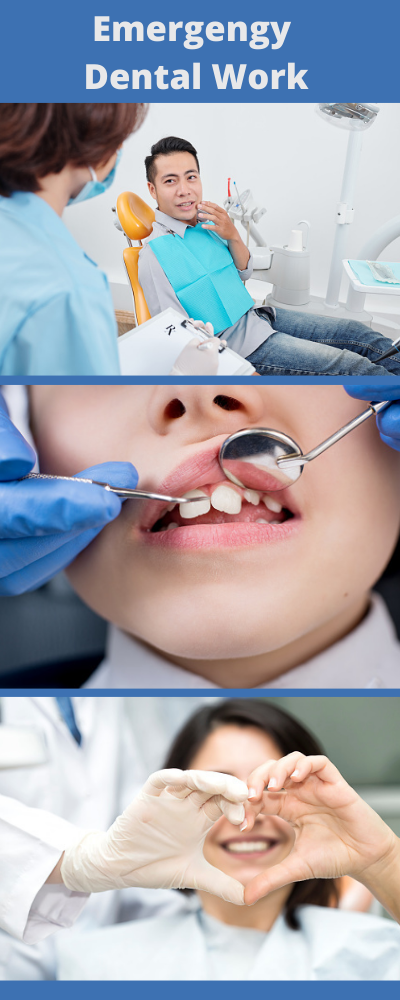


Oh no! You’ve just knocked out your tooth at a flag football game! What are you going to do on a Sunday when your local dentist is closed? Leaving the problem alone until even just the next day can result in permanently losing your tooth and even infection to set in.
When this happens, it’s important to see an emergency dentist. That’s where we come in. Save a Tooth will help connect you with the closest emergency dentist to your desired zip code.
Don’t wait until Monday to see your regular dentist and risk infection. Find your local emergency dentist and they’ll do everything they can to save your tooth.
To go or Not to go, THAT is the Question
Your typical emergency room has criteria for what constitutes an emergency and the same sentiment goes for emergency dental work. If you’re having trouble figuring out whether or not you should see an emergency professional, consider the following criteria:
- The unexplainable pain: When you notice debilitating pain in your mouth, it’s important to seek help right away. This is likely due to infection inside of your gums or the roots of your teeth. Leaving this can cause health issues throughout your entire body.
- Swollen Gums: Swollen gums are another sign of infection. Your gums may also swell if you’ve experienced trauma to your mouth. If you notice bleeding alongside the swelling, you need to contact a professional right away.
- You’ve experienced trauma: Any time you experience trauma to your mouth, it’s important to see a professional right away. Trauma can cause nerves to be exposed, which makes your mouth more susceptible to infections that can turn life-threatening.
- Knocked-Out Teeth: This is a form of mouth trauma, especially if it happens to adult teeth. If you take care of the tooth immediately after it falls out and see a professional right away, it can usually be reattached.
- Dental Abscesses: An abscess is a pocket of pus that can form on any part of the body. When you notice an abscess in your mouth, seeking emergency help is important, preferably before it bursts. Even more so after it bursts.
- Broken Crowns or Missing Fillings: Crowns and fillings are meant to provide protection to a damaged tooth. When a crown breaks or a filling falls out, your tooth becomes more susceptible to breakage and infection.

Preventing an Emergency
While you can’t always prevent an accident from happening, you can practice good oral hygiene to make sure your teeth and gums are strong enough to withstand an accident. It’s recommended to brush your teeth twice per day and replace your toothbrush or brush head every 3-4 months.
Make sure you use a soft-bristled brush and toothpaste that contains fluoride. Flossing every day, using mouthwash, and avoiding foods with excess sugar is also integral in maintaining good oral health.
Maintaining good oral hygiene is increasingly important for people who suffer from various diseases. Diseases like cardiovascular disease, diabetes, and HIV/AIDS make dental issues more common. Those who are pregnant may also notice dental problems throughout pregnancy.
Dental Assistance Princeton
Urgent Dental Assistance Easton
Urgent Dentist Middletown Township
Emergency Dentist Plainfield
Rapid Dental Service Morristown
Dental Services Montclair
Urgent Dental Service Clifton
Emergency Dental Service Valley Stream
Emergency Dental Help Glen Cove
Rapid Dental Help Shirley
Dental Help Services Westbury
Emergency Dental Deer Park
Urgent Dental Stony Brook
Dental Care Medford
Dental Assistance Riverhead
Urgent Dental Assistance New Bedford
Emergency Dental Assistance Johnston
Rapid Dental Help Attleboro
Urgent Dentist Taunton
Emergency Dentist Danvers
Rapid Dental Services Lawrence
Urgent Dental Services Lowell
Urgent Dentist Worcester
Emergency Dentist Framingham
Rapid Dental Service Needham
Dental Services Somerville
Urgent Dental Service Dedham
Emergency Dental Service Newton
Emergency Dental Help Burlington
Rapid Dental Help Waterville
Dental Help Services Lewiston
Emergency Dental Augusta
Urgent Dental Portland
Dental Care Dover
Dental Assistance Porstmouth
Urgent Dental Assistance Nashua
Emergency Dental Assistance Manchester
Rapid Dental Help Concord
Urgent Dentist Manchester
Emergency Dentist Woodstock
Rapid Dental Services Montpelier
Urgent Dental Services Plattsburgh
Urgent Dentist Whitney Point
Emergency Dentist Baldwinsville
Rapid Dental Service Hamburg
Dental Services Amherst
Urgent Dental Service Fairport
Emergency Dental Service Watkins
Emergency Dental Help Elizabethville
Rapid Dental Help State College
Dental Help Services Lewisburg
Emergency Dental Quakertown
Urgent Dental Reading
Dental Care New Kensington
Dental Assistance Imperial
Urgent Dental Assistance Bethel Park
Emergency Dental Assistance Monroeville
Rapid Dental Help Delmont
Urgent Dentist Jeannette
Emergency Dentist Belle Vernon
Rapid Dental Services Bronwsville
Urgent Dental Services Frederick
Urgent Dentist Ashland
Emergency Dentist Petersburg
Rapid Dental Service Manning
Dental Services Spartanburg
Urgent Dental Service Greenwood
Emergency Dental Service Greenville
Emergency Dental Help Seneca
Rapid Dental Help Anderson
Dental Help Services Macon
Emergency Dental Neptune Beach
Urgent Dental Ocala
Dental Care Spring Hill
Dental Assistance Hunters Creek
Urgent Dental Assistance Cocoa
Emergency Dental Assistance Kissimmee
Rapid Dental Help Zephy Hills
Urgent Dentist Auburndale
Emergency Dentist Vero Beach
Rapid Dental Services Palm Beach Gardens
Urgent Dental Services Lake Worth
Urgent Dentist Boynton Beach
Emergency Dentist Boca Raton
Rapid Dental Service Aventura
Dental Services Miami Gardens
Urgent Dental Service Sweetwater
Emergency Dental Service Coral Gables
Emergency Dental Help Kendall
Rapid Dental Help Quail Heights
Dental Help Services Defuniak Springs
Emergency Dental Crestview
Urgent Dental Daphne
Dental Care Fairfield
Dental Assistance Irondale
Urgent Dental Assistance Hartselle
Emergency Dental Assistance Athens
Rapid Dental Help Shelbyville
Urgent Dentist Cleveland
Emergency Dentist Ooltewan
Rapid Dental Services Clinton
Urgent Dental Services Kingston Springs
24 Hour Emergency Dental Care
